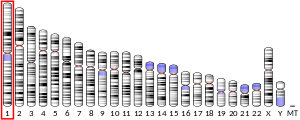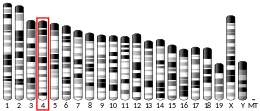AZIN2
Antizyme inhibitor 2 (AzI2) also known as arginine decarboxylase (ADC) is an enzyme that in humans is encoded by the AZIN2 gene.[5][6][7]
References
- 1 2 3 GRCh38: Ensembl release 89: ENSG00000142920 - Ensembl, May 2017
- 1 2 3 GRCm38: Ensembl release 89: ENSMUSG00000028789 - Ensembl, May 2017
- ↑ "Human PubMed Reference:".
- ↑ "Mouse PubMed Reference:".
- ↑ Pitkänen LT, Heiskala M, Andersson LC (2001). "Expression of a novel human ornithine decarboxylase-like protein in the central nervous system and testes". Biochem. Biophys. Res. Commun. 287 (5): 1051–7. doi:10.1006/bbrc.2001.5703. PMID 11587527.
- ↑ Zhu MY, Iyo A, Piletz JE, Regunathan S (2004). "Expression of human arginine decarboxylase, the biosynthetic enzyme for agmatine". Biochim. Biophys. Acta. 1670 (2): 156–64. doi:10.1016/j.bbagen.2003.11.006. PMC 3118518. PMID 14738999.
- ↑ "Entrez Gene: ADC arginine decarboxylase".
External links
- Human AZI2 genome location and AZI2 gene details page in the UCSC Genome Browser.
- Human AZIN2 genome location and AZIN2 gene details page in the UCSC Genome Browser.
Further reading
- Nagase T, Kikuno R, Ohara O (2001). "Prediction of the coding sequences of unidentified human genes. XXII. The complete sequences of 50 new cDNA clones which code for large proteins". DNA Res. 8 (6): 319–27. doi:10.1093/dnares/8.6.319. PMID 11853319.
- Coleman CS, Hu G, Pegg AE (2004). "Putrescine biosynthesis in mammalian tissues". Biochem. J. 379 (Pt 3): 849–55. doi:10.1042/BJ20040035. PMC 1224126. PMID 14763899.
- Choi KS, Suh YH, Kim WH, Lee TH, Jung MH (2005). "Stable siRNA-mediated silencing of antizyme inhibitor: regulation of ornithine decarboxylase activity". Biochem. Biophys. Res. Commun. 328 (1): 206–12. doi:10.1016/j.bbrc.2004.11.172. PMID 15670771.
- López-Contreras AJ, López-Garcia C, Jiménez-Cervantes C, Cremades A, Peñafiel R (2006). "Mouse ornithine decarboxylase-like gene encodes an antizyme inhibitor devoid of ornithine and arginine decarboxylating activity". J. Biol. Chem. 281 (41): 30896–906. doi:10.1074/jbc.M602840200. PMID 16916800.
- Tian H, Liu X, Zhang B, Sun Q, Sun D (2007). "Adenovirus-mediated expression of both antisense ornithine decarboxylase and S-adenosylmethionine decarboxylase inhibits lung cancer cell growth". Acta Biochim. Biophys. Sin. (Shanghai). 39 (6): 423–30. doi:10.1111/j.1745-7270.2007.00294.x. PMID 17558447.
- Levin VA, Jochec JL, Shantz LM, Aldape KD (2007). "Relationship between ornithine decarboxylase levels in anaplastic gliomas and progression-free survival in patients treated with DFMO-PCV chemotherapy". Int. J. Cancer. 121 (10): 2279–83. doi:10.1002/ijc.22914. PMID 17582600.
- Kanerva K, Mäkitie LT, Pelander A, Heiskala M, Andersson LC (2008). "Human ornithine decarboxylase paralogue (ODCp) is an antizyme inhibitor but not an arginine decarboxylase". Biochem. J. 409 (1): 187–92. doi:10.1042/BJ20071004. PMID 17900240.
This article is issued from
Wikipedia.
The text is licensed under Creative Commons - Attribution - Sharealike.
Additional terms may apply for the media files.



